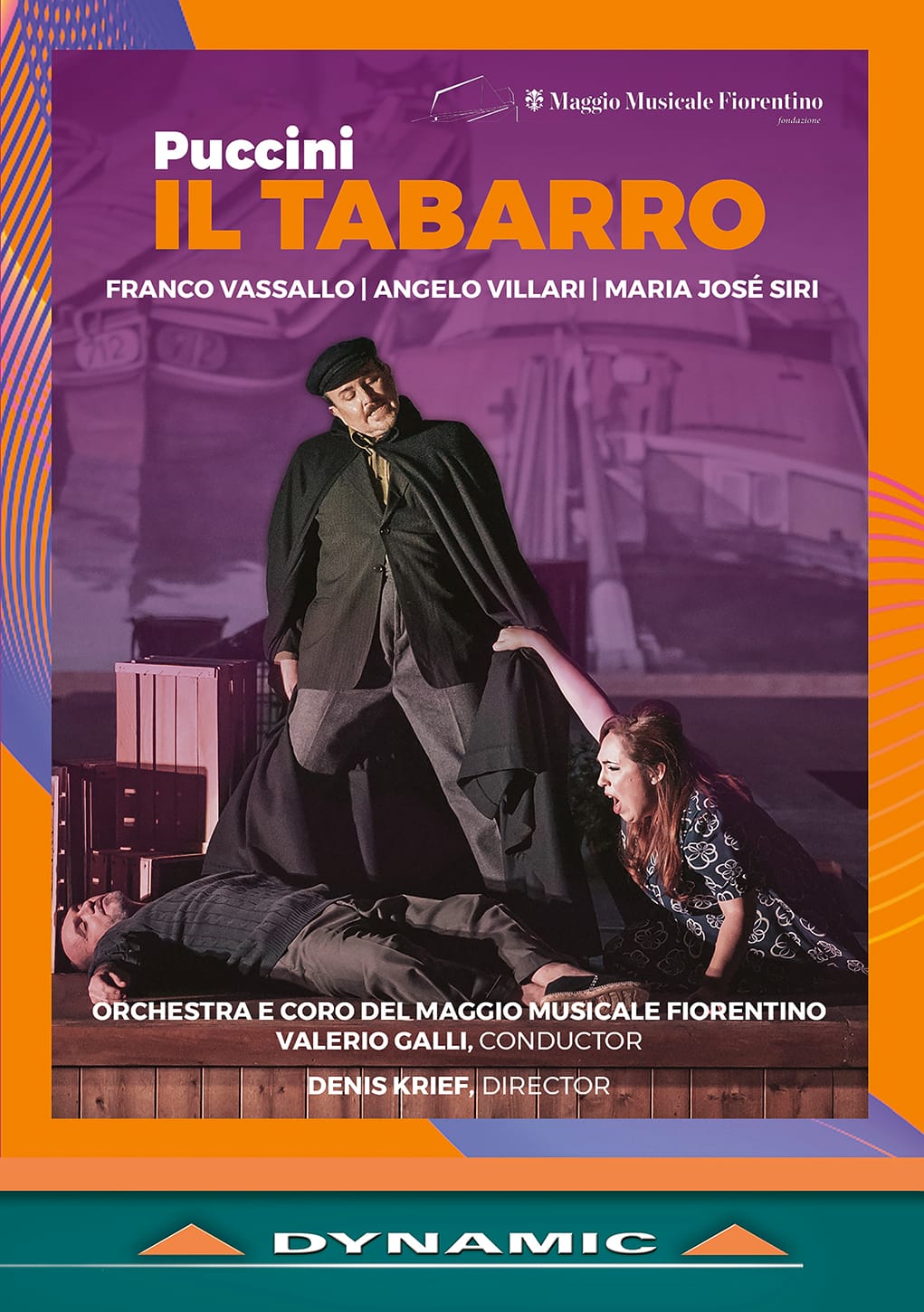
Described, accurately, by the notes as a “Parisian noir,” Il tabarro,” intended as the first of Puccini’s Trittico (a cycle of three opera designed to be performed in on evening).We reviewed the ENO incarnation of Suor Angelica (again in isolation) here; you can also read my review of the third panel, Gianni Schicchi, at Piacenza, Italy (a YouTube simulcast).
Il tabarro (The Cloak) was first performed in New York in December 1918; the libretto is by Giuseppe Adami, after Didier Gold’s 1910 play Houppelande. In the present production, there is a lovely touch at the beginning: the curtain rises on what looks like a ‘picture,’ a moment frozen in time, to silence. When the music starts, teh scene animates. A projected background of canal boats (the setting of the opera is the Seine, within sight of Notre Dame, around 1910).
What we have on this DVD/Bluray is a new staging of the Teatro del Maggio Musicale Fiorentino. Here’s the synopsis:
Michele is married to young Giorgetta and shares with her a life full of hardships on a barge over the river Seine. She is in love with Luigi, a young longshoreman hired by her husband during the loading of the barge. When Michele overhears his wife giving a rendezvous to Luigi by night, he waits for the man and attacks him, forces him to admit he is his wife’s lover and finally strangles him. Then he hides the body under his cloak, (il tabarro) and when Giorgetta, in mortal fear, comes on deck and asks Michele if he does not wish her to come and rest near him under his cloak, her wronged husband throws it open and Giorgetta discovers in horror her dead lover’s body rolling at her feet.
Set on a barge throughout, the atmosphere is positively claustrophobic. If there is one opera that is the essence of verismo, it is Tabarro. Puccini presents the river Seine itself via ostinati, suggesting a regularity and inevitability not only of time but of plot elements.
Denis Krief’s staging (he is director, plus set, costume and lighting designer!) is expertly used, with off-stage voices away from the main, raised portion of the stage (which represents Michele’s barge and which presents the action). Costumes are consistent, and the smaller parts ae consistently well taken. In particular, Anna Maria Chiuri’s La Frugola is dripping with character. Who it comes to the murder and the cloak, I find it well done: the darkening of the stage at that point enables silhouettes and the blending of Luigi’s body with the cloak effectively.
The big name here is Maria José Siri, who I found spellbinding in the Covent Garden concert performance of Verdi’s Attila in 2022 (review; there, Siri was actually replacing Sondra Radvanovsky, and she was far from the only replacement in this covid-hit cast). When Giorgetta sings of he humble beginnings (“I was born in the suburbs”), Siri is transfixing, and Valerio Galli’s handling of the orchestral counterpoint at that point is masterly. In fact, Galli paces the whole opera superbly, the various shades of dark moving inevitably towards the fatal conclusion.
Her counterpart, the baritone Franco Vassallo as Michele, is equally superb, his scene with Giorgetta when he looks back to their child stunningly effective vocally (even if his subsequent acting is rather stiff); his brooding “Nulla, silenzio,” alone on stage, culminates in a powerful “Peace is in death!”. And the third part of the triangle, tenor Angelo Villari as Luigi is everything one could want for in a Puccini tenor. When tenor and soprano sing together in extended octaves, the effect is near-overwhelming (and, although this is with orchestra, the two sing this in tune: I think of the famous Tosca unaccompanied octaves in the final act that come cropper almost every time).
The drop of lighting at the hiding of the body is effective in context; Krief maximises the static staging in a triumph of imagination. A most effective staging overall, holding a fine cast.
Here is the trailer for this performance:
It is strange to see this opera alone on one DVD/Bluray (54 minutes, no extras) but this remains a fine exposition of one of Puccini’s most unrelentingly dark moments. A review of full Trittico (Christof Loy’s staging from Vienna) will follow in due course.
Bizarrely the Blu-ray is almost £7.50 cheaper than the DVD on Amazon.









